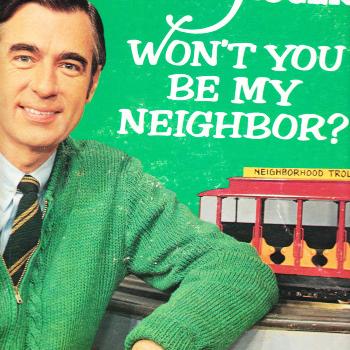This report on a debate at NYU on the subject “The World Would Be Better Off Without Religion” is depressing.
If one is going to produce a staged re-enactment of a late-night dorm-room bull session — without even the benefit of pizza and alcohol that such conversations generally require — then at least try not to include rabidly dishonest racist jackwagons like Dinesh D’Souza.
The New York Times’ Jennifer Schuessler captures my own reaction to this stale ritual when she quotes Charlie Dunbar Broad for describing such debates “as having ‘acquired the repulsiveness of half-cold mutton in half-congealed gravy’ (and that was in 1939).” That’s just as evocative and somewhat more polite than the image I first thought of, which was that things like this are a pointless wankfest.
Whether one regards it as a good or an ill, religion is a pervasive and persistent aspect of the world we live in. “Yeah, but what if it wasn’t?“could provide the basis for a fascinating work of speculative fiction — whether utopian or dystopian — but not for a constructive or meaningful “debate.” Similarly academic debates were held in the 19th Century on the topic of “The World Would Be Better Off Without Alcohol” and they proved just about as practical and enlightening.
Those debates, at least, began with more of a shared definition of terms, with both sides roughly agreeing on the meaning of “alcohol.” The debate described above, like most such plates of congealed gravy, consists of one side begging the question by arguing that the world is a better place due to the presence of “religion — the well-spring of virtue, meaning and goodness” and the other side begging the question by arguing that the world would be better off without “religion — that fantastical and harmful set of superstitions.”
Yawn.
My main complaint with such debates is not that one side is required to argue against religion, but that both sides wind up arguing against pluralism. I am fiercely committed to pluralism, not just because it’s a central tenet of my own Baptist sect, but because I cannot see how we could do without it without finding ourselves in a monstrous situation.
“It does me no injury for my neighbor to say there are 20 Gods or no God,” Thomas Jefferson said. “It neither picks my pocket nor breaks my leg.” But once we decide that such pluralism is unacceptable — that we would be “better off” if everyone believed there are 20 Gods, or if everyone believed in one particular notion of God, or if everyone believed there is no God — then pockets will be picked and legs will be broken.
The opposite of pluralism is coercion.
I’m not suggesting that any of the cast in the NYU debate was advocating such coercive intolerance of religion/non-religion. The formulation of “better off” seems deliberately vague and flaccid so as not to suggest that. But once we conclude that we would be “better off” is if everyone embraced temperance, the next step always seems to be advocating measures to assist or encourage or require everyone to do so until “temperance” becomes “prohibition.”
I addressed this a bit in a footnote to a post a few years ago:
The world seems wrong and we want to see it made or remade right.
Every religion worth anything addresses this dilemma in two ways. First by requiring that its adherents practice both charity and justice here in this life. And second by extending the hope that such unfairness will ultimately be rectified, if not in this world, then in the next.
When religion goes awry or becomes corrupt, it often results from or results in an emphasis on one of those two aspects to the neglect of the other.
Corruption A: Emphasize the hope for eschatological justice to the neglect of justice in this world and you end up with the “pie in the sky when you die” opiate used to justify every oppressive caste system from Bombay to Alabama.
Corruption B: Emphasize justice in this world to the neglect of the hope for eschatological justice and you begin thinking that you can impose perfect, infallible justice here in the temporal realm – an idea that quickly gallops off into oppressive theocracy of one form or another.
Our history books and newspapers are so full of examples of both of those errors that it can be tempting to think that maybe religion itself is the problem – that if we could just stamp out religion, we could end oppression and establish perfect justice. If that idea seems attractive to you, see again Corruption B above.












